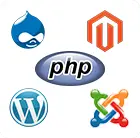ItHow to add libraries in PHP?
In PHP, you can add libraries or packages to your project using a dependency management tool called Composer. Composer simplifies the process of installing, updating, and managing external libraries in PHP projects. Here’s a step-by-step guide on how to add libraries in PHP using Composer:
Step 1
Install Composer If you haven’t already installed Composer, you can download and install it globally on your system by following the instructions on the Composer website: https://getcomposer.org/download/
Step 2: Create a composer.json File In your PHP project directory, create a file named composer.json. This file will specify the dependencies your project requires.
{ “require”: { “vendor/package-name”: “version” } }
Replace “vendor/package-name” with the name of the library you want to add and “version” with the desired version constraint. For example, to add the Guzzle HTTP client package with the latest version, your composer.json might look like:
{ “require”: { “guzzlehttp/guzzle”: “^7.0” } }
Step 3
Run Composer Install Open a terminal or command prompt, navigate to your project directory (where composer.json is located), and run the following command:
Composer will read the composer.json file, download the specified library and its dependencies,
and install them in the vendor directory within your project.
Step 4
Use the Library in Your PHP Code After installing the library with Composer,
you can start using it in your PHP code. In your PHP files, include the Composer-generated autoloader at the top:
Now you can use the classes and functions provided by the library in your PHP code.
Step 5
Update Dependencies (Optional) If you want to update the library to a newer version or add more libraries to your project, you can modify the composer.json file accordingly and run:
This will update the libraries to the latest compatible versions as per the version constraints specified in composer.json.
Composer will automatically manage the dependencies, making it easy to add, update,
and remove libraries as needed, ensuring a smooth development workflow in your PHP projects.
Best PHP training in Chandigarh It is provide by Cbitss in sector-34 in Chandigarh
How many types of PHP are there?
As of my knowledge cutoff date in September 2021, there are primarily two major versions of PHP that are actively supported:
PHP 5.x (EOL)
PHP 5 was a significant version of PHP and introduced many features that were widely used for several years.
However, PHP 5 reached its End of Life (EOL) on December 31, 2018, and is no longer actively maintained or supported. Using PHP 5 is strongly discouraged as it may have security vulnerabilities and lacks the latest language improvements.
PHP 7.x
It was a major release that brought substantial performance improvements and new language features. It was officially release on December 3, 2015, and has several sub-versions (e.g., PHP 7.0, PHP 7.1, PHP 7.2, PHP 7.3, PHP 7.4, PHP 7.4, PHP 7.4, PHP 7.4) with incremental improvements and bug fixes.
As a general rule, developers are encourage to use the latest stable release of PHP 7 for new projects. PHP 7 offers significant performance improvements over PHP 5 and includes new language features, making it a more efficient and modern choice for web development.
It’s important to note that PHP development is continually evolving, and newer versions may have released after my knowledge cutoff date.
Always check the official PHP website (php.net) or relevant community resources to find the latest information and updates on PHP versions and their support status.
If you required any then visit our website:- PHP training in Chandigarh
Read more article:-Thegroupofambikatarlor.
